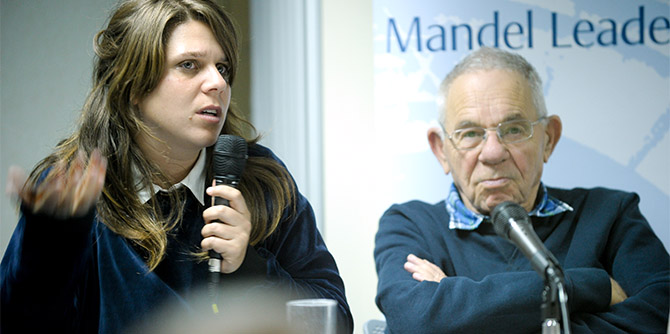“A bird doesn't sing because it has an answer, it sings because it has a song.” Daphni Leef used this quote by Maya Angelou to encapsulate the themes discussed at
Creating Change: From Ideas to Political Acts, a Mandel Platform event held at the Mandel Leadership Institute on January 9, 2016.
“I was raised on contempt for politics and politicians. But without democracy, how could we change things? If we are not there when decisions are being made, who will be?” said
Ruth Calderon, former member of Knesset and a faculty member at the Institute, who moderated the event. “Tonight’s session looks at the question of how we leave the Institute and go on to do something that really changes things.”
Speaking at the event were former member of Knesset
Yehuda Harel, founder of the Third Way party, initiator of the Golan Law, and member of Kibbutz Merom Golan, whose book
Privatization analyzes the reasons for the failure of the kibbutz movement;
Pnina Tamano-Shata, a former member of Knesset for Yesh Atid, lawyer, social activist, and one of the founders of the National Ethiopian Program; and
Daphni Leef, one of the founders and leaders of the social protests of 2011.

Daphni Leef, founder of the social protest, and Former MK Yehuda Harel at the Mandel Platform event
Daphni Leef, founder of the social protest, and Former MK Yehuda Harel at the Mandel Platform event
The evening opened with breakout sessions in which each of the speakers described their public activity. It then continued with a plenum session in which the speakers answered questions from the audience about what motivated them to act, the role of ego in public and political leadership, and the importance of a plan of action for implementing political ideas.
Daphni Leef: “The problem is that we often try to solve problems instead of following a vision. If your heart is empty, then what you have in your head is meaningless…. How do you decide to do something that changes reality? It happens when your comfort zone no longer exists, and you’re left with a situation you can’t live with anymore. Change doesn’t come from solving problems, but from passion and frustration.”
Pnina Tamano-Shata: “There are moments, and Jewish law says this too, when leadership needs to take a stand, and when compromise is seen as a kind of transgression. You must stand up and speak out, not be reserved and humble. There are times when humility itself becomes the problem.”
Yehuda Harel: “In all of my successes, the plan of action was formed on the fly… I don’t believe in macro planning. You can plan at the micro level, but at the macro, it’s impossible to anticipate the future. You should never be enslaved to a plan…. A plan of action is more of a threat than a benefit.”
